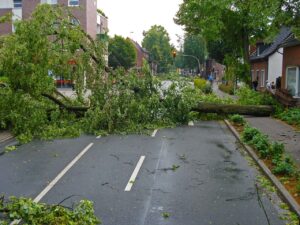If You Stayed Home to Ride Out the Storm
If you stayed home to ride out the storm, it’s important not to rush outside once the winds die down. Wait for official confirmation that the storm has passed, listening to your NOAA weather radio or local news for updates before leaving your home. Avoid drinking, cooking with, or brushing your teeth using tap water until authorities declare it safe. If you’ve lost contact with friends or family, the Red Cross maintains a list of shelter inhabitants to help reunite people safely. Never run a generator inside your home, garage, or near windows, as carbon monoxide poisoning can be deadly. Finally, check your smoke and carbon monoxide detectors to ensure they are functional before using appliances or generators.
If You Evacuated and Are Returning Home
If you evacuated and are returning home, your safety continues to be the top priority. Only return once local officials have declared roads and neighborhoods safe. Avoid driving through standing water, which can conceal debris or sweep vehicles away. Upon arriving home, check for obvious dangers such as the smell of gas, fire, or floodwaters blocking access and leave the area if any hazards are present. Before entering your home, examine the exterior for structural damage to your roof, walls, or foundation, as damage may not be immediately obvious.
How to Assess Hurricane Damage Safely
 Once it’s safe, begin assessing and documenting damage. Inspect the exterior carefully and only enter the home if it appears structurally sound. Inside, look for water damage, electrical hazards, or gas leaks. Be aware of hidden hazards in and around your home such as displaced wildlife, snakes, or rapidly multiplying mosquitoes. Keep doors and windows closed or screened and use insect repellent as needed. Report downed power lines, broken gas lines, or other dangerous conditions to local authorities before beginning cleanup. When the area is safe, take detailed photos and videos of damage, room by room, and make a list of damaged items to share with your insurance provider.
Once it’s safe, begin assessing and documenting damage. Inspect the exterior carefully and only enter the home if it appears structurally sound. Inside, look for water damage, electrical hazards, or gas leaks. Be aware of hidden hazards in and around your home such as displaced wildlife, snakes, or rapidly multiplying mosquitoes. Keep doors and windows closed or screened and use insect repellent as needed. Report downed power lines, broken gas lines, or other dangerous conditions to local authorities before beginning cleanup. When the area is safe, take detailed photos and videos of damage, room by room, and make a list of damaged items to share with your insurance provider.
Emotional Recovery and Long-Term Resilience
Hurricane recovery isn’t just about repairing property, it’s also about rebuilding peace of mind. Take time to care for yourself and your loved ones, and utilize local and national resources for housing, food, and emotional support if needed. Once repairs are complete, review your insurance coverage and consider reinforcing your home against future storms. Measures like strengthening roofing, installing storm shutters, and maintaining proper drainage can help protect your home next time.
At Heritage, we understand that hurricane recovery can be stressful, but you don’t have to face it alone. Our team is here to help you navigate claims, protect your property, and get back on your feet as quickly as possible. If you’ve been affected by a recent storm, contact us today, and together, we’ll rebuild stronger and safer than before.







